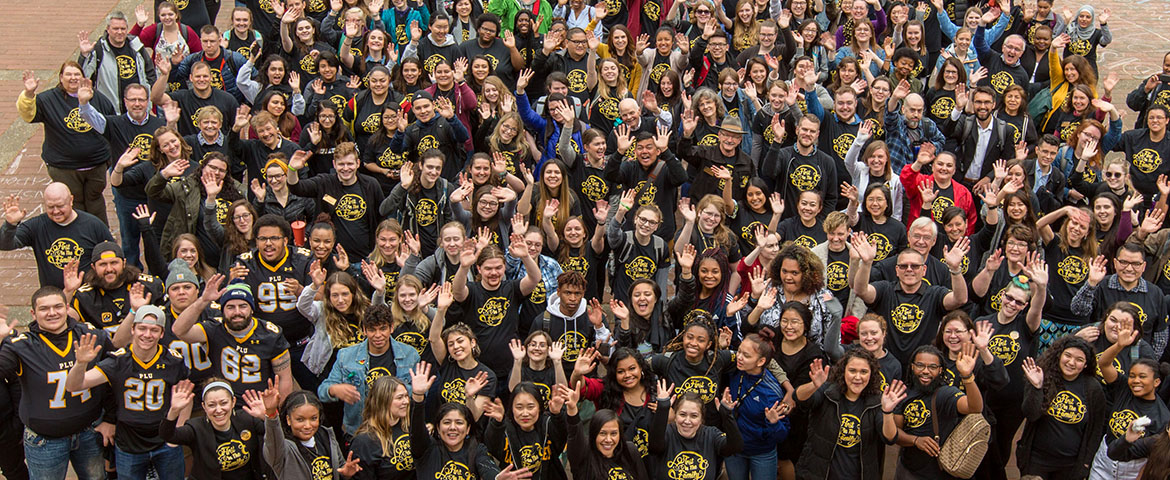How First Gens thrive

Image: First in the family group photo made up of staff, faculty, and students at PLU, Friday, April 27, 2018. (Photo: John Froschauer/PLU)
By Nicole Gonzales
Residential Life
I am proud to be a first-generation college graduate, or what Pacific Lutheran University calls “first in the family” — someone whose parents didn’t graduate from four-year, degree-granting institutions in the U.S.
Navigating college can be difficult for any student, but it’s particularly challenging when you or your family might not understand the ins and outs of higher education. For those learning to navigate the language and culture of college, here are five things every current and incoming first-in-the-family student should know. And Gurjot Kang ’21 — a current first-generation student living in the “First in the Family” community in Stuen Hall — shares her perspective.
1. You’re not alone.
Kang shares how to build community: “I think through opening up a greater dialogue and not being afraid to share your experiences as a first-in-the-family (FIF) student, as well as seeking advice from upperclassmen who are also FIF students, is one of the greatest ways in which a community has been built at PLU. Last month, I went on a FIF retreat for our residence hall wing and the most important thing I took away from that is to realize that you’re not alone in any of your experiences.”
2. Self-care.
Self-care isn’t just about surviving, it’s about self-preservation. To survive is to remain in existence, but preservation is to persist — to maintain your purpose in spite of difficulty and discouragement. Self-care may include using resources such as the Health and Counseling centers, making time for friends and fun, and simply eating well. If the well-being of you or someone you know is lacking, the Student Care Network is there to back you up.
“Self-care (for me) would definitely have to do with trying to balance school and extracurriculars,” Kang said. “This is something I often struggle with. As a (first-gen) student, I sometimes get into this mentality that every opportunity that I don’t take to get involved in something is a missed opportunity, which leads me to doing a bajillion things at once. But I need to remind myself that I’m only one person, and though I might be interested in getting involved in many things, there’s only so much I can do. It’s OK to try new things every year while still pursuing what I’m most passionate about, which is writing, journalism, politics and social justice.”
3. A family-college balance.
Leaving home does not mean leaving your family. Still, it can sometimes be hard to explain to them that you can’t come home because you’re stressed about a paper due on Monday. Balancing the two worlds looks different for everyone, but it gets easier to manage over time.
“Often with first-generation students, there is a pressure to do majors that have a more direct career path after college,” Kang said. “That is what my family wants me to do as well, so I’m kind of still deciding and figuring out a balance between that but also majoring in something I’m passionate about.”
4. Financial aid is confusing.
It’s OK to ask a lot of questions about financial aid. Advocate for yourself — it’s your education and your wallet. Seeking help is nothing to be ashamed of, and help comes from many places: offices across campus such as Student Financial Services, Admission and the Center for Student Success all offer resources to help all students with the tough questions.
“I think the best way to navigate the process is not being afraid to schedule an appointment with an advisor from the financial aid office if you’re ever confused about something,” Kang said. “Also, trying to apply for scholarships is something I try to do whenever possible in my free time. There are also often a lot of major specific scholarships you can apply to. Don’t be afraid to ask your academic advisors about how to apply.”
5. Classes are hard — especially when you don’t know what to expect.
You aren’t in high school anymore. College is a different beast. Classes are harder, approaching professors can be intimidating, and you’re responsible for everything — whether it’s on the syllabus or not.
“I think I’ve always pushed myself to try my absolute best,” Kang said. “I have this sort of mentality to try to step outside of my comfort zone whenever possible and encourage myself to do things that I might otherwise be afraid to do. I try to remind myself that not everything has to be perfect, sometimes it’s OK if things are just ‘good.’”



Social Media